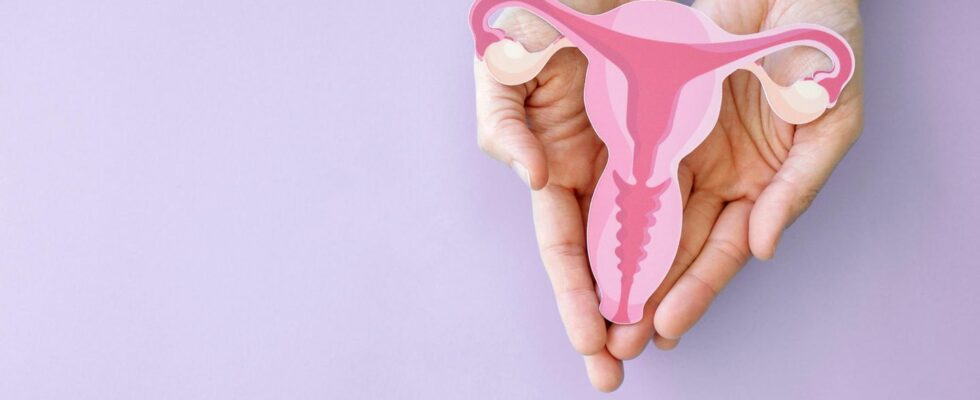It is one of the most important organs and yet is completely underrepresented in research. Midwife and journalist Leah Hazard wants to change that.
Interview: Nina Berendonk
They have a whole book about them uterus written. Why do we need this?
Leah Hazard: You can find dozens of books in bookstores about every possible area of our body, but none about the uterus: the organ that is most often treated, most heavily regulated, and least understood.
What do you think is the most important thing we need to learn about her?
First: that we don’t know enough. The more I researched the book, the more I realized how big the gaps in my knowledge are, even as a midwife. Research into the uterus is chronically underfunded. Second, if you have a uterus, many people have opinions about it. State, church, national and international jurisprudence, philosophy, your partner, even the person who sits next to you on the bus and perhaps comments on your pregnant belly. Only the woman herself has control over her uterus. But in order to be able to stand up for ourselves in this sense, we also need knowledge about our bodies.
How does the disadvantage of the uterus manifest itself specifically in research operations?
For my book, I spoke to the doctor Christine Metz, who researches endometriosis in the USA. When she sought funding for her studies, she compared the number of studies on semen and those on menstrual blood: there were 15,000 on semen and just 400 on female secretions. This small example is indicative of the state of research in women’s and reproductive medicine.
Why is that?
This is probably a result of patriarchy. In the history of medicine, the people who conducted research and decided on the funds needed for it were primarily men – and the majority were not interested in women’s health. Many of the scientists I spoke to for the book complained about this. This is a missed opportunity.
In what way?
Firstly, because women make up half of the population. If we research the uterus better, it will also help us to better understand the processes in the male body. Let’s take menstruation: a completely scar-free healing process in which this organ regenerates itself month after month. Understanding how this works could be an enormous gain in knowledge for everyone.
Keyword menstruation: In our society, it has long been considered a disgusting waste product.
Yes, unfortunately. This fluid, which by the way does not consist largely of blood, has a biochemical fingerprint. If we can successfully decipher this print, women could be saved from many misdiagnoses and years of suffering, while avoiding immense costs for the healthcare system and society. But that’s just a small piece of the puzzle. We miss so many opportunities to move forward.
Are men also to blame for disgust with periods?
I think after thousands of years of misogyny and sexism we’ve all internalized this. Not just when it comes to menstruation – menopause is also rather “yuck”. Fortunately, this is changing in younger society. There is greater openness, especially on social media, including when it comes to endometriosis. My daughters, ages 20 and 17, are much more open about their periods and vaginas than I was at their age. Even today I sometimes have to push myself a little.
The so-called “Period Pride” already exists. Maybe we can also develop more pride in our wombs?
It would be nice if at least curiosity arose. Having a uterus isn’t all sunshine and roses, I’m the first to admit that. When I have cramps and have to go to work and none of my medications are working, I don’t think it’s great to be a woman. But even then, I try to understand what my body is doing and respect it for that. This also applies to my perimenopause, which has really taken its toll on me over the past year.
How come?
With fears and a foggy brain. Luckily I had already finished the book. Like most women, I thought I was doing something wrong: I was under too much stress, I was no longer productive, I was getting old. After a few attempts with nature-identical hormones, I now feel better. But it is a process – one that, despite all my knowledge, I was not prepared for.
Can “uterine wellness” à la Gwyneth Paltrow help? You have also tried “Yoni Steaming”, a vaginal steam bath, yourself.
(laughs) This is a complex topic. There are many women who are dissatisfied with conventional medicine. So we have receptive consumers who are highly motivated to find solutions and spend money on them. And providers who are keen to meet this demand – sometimes with offers that are very expensive, whose effectiveness has not been proven and which, in the worst case, are harmful to health. But you shouldn’t stigmatize women any more than stupid cows who bought this tool or those herbs. We need to think more about the soil on which this industry grew.
Finally, tell us your favorite fact about the uterus.
The role it plays in sex and conception. Many women only notice in their stomachs during pregnancy that the uterus contracts during orgasm. We are always taught that the female body has a very passive role in conception, simply lying there waiting while the sperm heroically fights its way through the hostile environment. The wave-like movements of the uterus serve to pull the sperm into its interior. There she has little bags in which she can even store it before it goes to the egg. That blew me away.
Leah Hazard
The American-born woman is a journalist and midwife and lives in Scotland. For her current book “Where everything begins – the unexpected power of the uterus” (416 pages, 24 euros, Atlantic) she spoke to many women and scientists.
